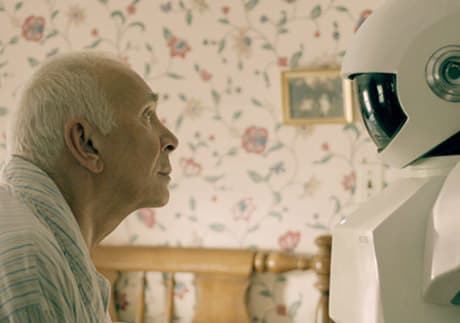Judging by the trailer and synopsis for Jake Schreier's feature film debut, Robot & Frank, it's a heart-warming story about a curmudgeonly, aging ex-jewel thief named Frank (Frank Langella) befriending a sassy robot that helps him relive his irreverent youthful hijinks. Presumably this bond, and the resultant vile anthropomorphizing of a computer on wheels, will help him recapture his youth and find a new zest for life.
But Schreier's exceedingly astute play on the notion of memory as a make-up of identity is far more complex and honest than the initially cutesy, saucy robot veneer might suggest. Chiefly, we're reminded at every turn that the robot (voiced by Peter Sarsgaard) has no feelings whatsoever and is merely parroting the commands and verbalized ideology provided by his owner, who, incidentally, is suffering from the early stages of Alzheimer's.
This doesn't keep things from frequently delving into the comedic, seeing as Frank is initially reluctant to acknowledge the robot, since it was given to him passive-aggressively by his humourless corporate son, Hunter (James Marsden), as an ersatz nurse and housekeeper hybrid. And his surly disposition towards a talking computer unable to process sarcasm results in a series of amusing and surprisingly irreverent exchanges.
Similarly, while the secondary thematic expansion of technological progress as a visual representation of mortality is quite heavy, the manner in which it's portrayed on film ― with Frank routinely going to the last standing library to check out paper-based books from foxy librarian Jennifer (Susan Sarandon) ― also helps build up a love interest angle. This playful handling of a complex and ultimately devastating message, or parable, is what distinguishes this comedy of sorts from something like Sarah Polley's Away from Her.
Despite this, as Frank's memory diminishes and the robot takes on more of his characteristics, the question of its indifference to its memory versus the bleak reality that this mechanical mirror is his only friend speaks multitudes about change and progress ultimately making everything preceding irrelevant, including us as individuals.
(Sony)But Schreier's exceedingly astute play on the notion of memory as a make-up of identity is far more complex and honest than the initially cutesy, saucy robot veneer might suggest. Chiefly, we're reminded at every turn that the robot (voiced by Peter Sarsgaard) has no feelings whatsoever and is merely parroting the commands and verbalized ideology provided by his owner, who, incidentally, is suffering from the early stages of Alzheimer's.
This doesn't keep things from frequently delving into the comedic, seeing as Frank is initially reluctant to acknowledge the robot, since it was given to him passive-aggressively by his humourless corporate son, Hunter (James Marsden), as an ersatz nurse and housekeeper hybrid. And his surly disposition towards a talking computer unable to process sarcasm results in a series of amusing and surprisingly irreverent exchanges.
Similarly, while the secondary thematic expansion of technological progress as a visual representation of mortality is quite heavy, the manner in which it's portrayed on film ― with Frank routinely going to the last standing library to check out paper-based books from foxy librarian Jennifer (Susan Sarandon) ― also helps build up a love interest angle. This playful handling of a complex and ultimately devastating message, or parable, is what distinguishes this comedy of sorts from something like Sarah Polley's Away from Her.
Despite this, as Frank's memory diminishes and the robot takes on more of his characteristics, the question of its indifference to its memory versus the bleak reality that this mechanical mirror is his only friend speaks multitudes about change and progress ultimately making everything preceding irrelevant, including us as individuals.
